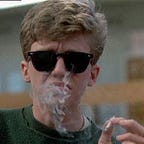The Pope of Greenwich Village (1985)
The Pope of Greenwich Village (1985), directed by Stuart Rosenberg, is a buddy-drama heist film set and filmed on the streets of New York. Charlie (Mickey Rourke) and Paulie (Eric Roberts) are Italian cousins who just got fired from their restaurant job for stealing money from the higher ups. Down on their luck, Paulie schemes up a plan to buy a “champion” racehorse on a loan, then rob a safe to pay back the bank. Little do they know the safe belongs to mob boss Bed Bug Eddie (Burt Young), who sets out to take his revenge on the cousins. It’s a well-executed, performance driven film that presents a true to life atmosphere and an interesting commentary on masculinity, family, and the New York (specifically Italian) lifestyle.
I’d like to start this analysis by admitting how shocked I was to see that Mickey Rourke played the role of Charlie. As someone who’s only really familiar with his role in The Wrestler (2008) it was honestly alarming to see him pre-facelift. His work in Pope is excellent, he takes on the cool, serious, ladies man persona with ease, in a performance reminiscent of DeNiro or Pacino — an impressive feat considering his German-Irish heritage. Charlie as a character is an excellent counterpart to his cousin Paulie, the crafty, fast-talking knucklehead that drags his cousin into his ridiculous plans. Eric Roberts delivers a rollercoaster performance, and though his character doesn’t really have an arc per se, watching his face conjure up a revenge plot on a policeman or wailing in tears against a fence showcases a serious depth to his acting range.
The two are criminals, much like in the last two buddy films we examined, and their dream of finding happiness outside of the system seems to be a common theme in this genre. They’re excellent foils for each other and in a way present two versions of masculinity, in a way not too different than in Thunderbolt and Lightfoot (1974). Charlie is reserved, nonchalant, generally serious; Paulie is wild, emotional, even bipolar at times. See the clip here for the ultimate example. His thumb freshly taken from him, he fluctuates between depression and rage, from misery over his thumb to sympathy for Charlie. Whether these are simply genre archetypes or an implication of something deeper, like in Thunderbolt, well that’s for you, the viewer to decide.
Another admission, viewing this from a queer lens creeps me out thoroughly. Charlie and Paulie are cousins, third cousins to be exact. As their locksmith Barney says, “That’s like twin brothers with the Irish”. When Paulie says “It’s like our moms said, ‘You gotta stick to your own kind’” he’s referring to their ethnicity, not some gay incestual romance. Art is art and its up to interpretation, but them walking arm in arm is not a wink to a romantic subtext. They’re family, and the bond of family is what drives them to get out of their dangers alive. Really it’s what gets them into trouble in the first place; they work together, they steal together, they get fired together, then they steal together some more. It’s the irrational familial bond that makes you keep trying what you’ve failed at, because your cousin says you should.
Yes, Pope features outwardly straight men showing their emotions to each other. This is what families do. It’s a connection deeper than just being buddies, deeper even than romantic love. It’s unconditional. I’ve cried with my brother, with my parents, well into my late teens. Families allow for this sort of emotional expression you wouldn’t see between friends or coworkers. Paulie and Charlie survive every challenge because they stick together, because they’re family. Especially because they’re part of a large, ethnic family in New York City.
The New York City setting of this film and it’s on location filming gives it that lived-in, real-life fairytale atmosphere many movies like it have. New York City is the epitome of hustle-and-bustle, the kind of town that’ll eat you alive if you let it. It informs both themes of family and masculinity that we discussed prior. To make it in this city you have to scrape for every dollar, and it really helps to have friends. Your family is your built-in friend group, so sticking together through thick and thin is bound to help you out one day, how do you think Paulie got the waiter job? As for the masculinity, they have to be, or at least present as, tough in New York, whether through Charlie’s stylish bravado and explosive outbursts or Paulie’s slick-talking persona and weaselly schemes. The Pope of Greenwich Village delivers an extremely satisfying New York City fairy tale that delves into the power of family, the different approaches to masculinity, and how these themes present themselves in the The Big Apple.
